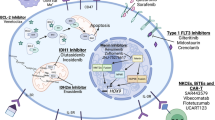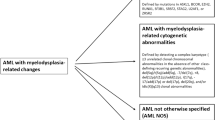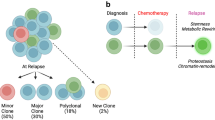Abstract
Hypomethylating agents, such as 5-azacitidine (5-AZA) and 5-aza-2’-deoxycytidine (decitabine), have recently been approved for the treatment of myelodysplastic syndromes (MDS). Several randomized trials have shown favorable results concerning response rate, survival, transformation to acute leukemia, and quality of life. In these trials, treatment was administered continuously until progression. In the retrospective study presented here, we evaluated the outcome of patients with higher risk MDS or secondary acute myeloid leukemia (sAML) treated with a limited number of 5-AZA cycles. A total of 32 patients received 5-AZA alone (n = 30) or in combination with valproic acid and all-trans retinoic acid (n = 2). 5-AZA was administered subcutaneously at a fixed dose of 75 mg/m2 daily for 7 days and repeated every 28 days. 5-AZA was given for a median of four courses. Treatment was continued for two more cycles as consolidation in patients who had achieved complete remission (CR), marrow CR, or stable disease with hematologic improvement. The overall response rate was 50% according to the modified International Working Group criteria. Complete remissions were achieved in 15.6% and stable disease in 34.4% of patients. Peripheral blood counts normalized in 6.3% of patients while hematologic improvement was achieved in 25%. The median time to AML in responding patients was 45 weeks, while AML occurred after a median of 14 weeks in non-responding patients (P = .038). The median survival of all patients was 60 weeks; the median survival of responders was 74 weeks compared with 26 weeks in non-responders (P = .047). In this retrospective analysis, 5-AZA was associated with a survival advantage in responding patients with higher risk MDS or sAML. These favorable results suggest that patients may benefit even from a limited number of courses of 5-AZA. A randomized controlled clinical trial is required to prospectively validate these findings.


Similar content being viewed by others
References
Bhalla KN (2005) Epigenetic and chromatin modifiers as targeted therapy of hematologic malignancies. J Clin Oncol 23:3971–3993
Herman JG, Baylin SB (2003) Gene silencing in cancer in association with promoter hypermethlyation. N Engl J Med 349:2042–2054
Jones PA, Baylin SB (2002) The fundamental role of epigenetic events in cancer. Nat Rev 3(6):415–428
Antequera F, Boyes J, Bird A (1990) High levels of de novo methylation and altered chromatin structure at CpG islands in cell lines. Cell 62(3):503–514
Brakensiek K, Langer F, Schlegelberger B et al (2005) Hypermethylation of the suppressor of cytokine signalling-1 (SOCS-1) in myelodysplastic syndrome. Br J Haematol 130(2):209–217
Aoki E, Uchida T, Ohashi H, Nagai H, Murase T, Ichikawa A et al (2000) Methylation status of the p15INK4B gene in hematopoietic progenitors and peripheral blood cells in myelodysplastic syndromes. Leukemia 14(4):586–593
Cameron EE, Bachman KE, Myöhänen S, Herman JG, Baylin SB (1999) Synergy of demethylation and histone deacetylase inhibition in the re-expression of genes silenced in cancer. Nat Genet 21:103–107
Silverman LR, Demakos EP, Peterson BL, Kornblith AB, Holland JC, Odchimar-Reissig R et al (2002) Randomized controlled trial of azacitidine in patients with the myelodysplastic syndrome: a study of the cancer and leukemia group B. J Clin Oncol 20(10):2429–2440
Wijermans P, Lubbert M, Verhoef G, Bosly A, Ravoet C, Andre M et al (2000) Low-dose 5-aza-2’¢-deoxycytidine, a DNA hypomethylating agent, for the treatment of high-risk myelodysplastic syndrome: a multicenter phase II study in elderly patients. J Clin Oncol 18(5):956–962
Kantarjian HM, Issa JP, Rosenfeld CS, Bennett JM, DiPersio MA, Klimek V et al (2006) Decitabine improves patient outcomes in myelodysplastic syndromes. Cancer 106(8):1794–1803
Kantarjian HM, Oki Y, Garcia-Manero G, Huang X, O’Brien S, Cortes J et al (2007) Results of a randomized study of 3 schedules of low-dose decitabine in higher-risk myelodysplastic syndrome and chronic myelomonocytic leukemia. Blood 109(1):52–57
Kornblith AB, Herndon JE 2nd, Silverman LR, Demakos EP, Odchimar-Reissig R, Holland JF et al (2002) Impact of azacytidine on the quality of life of patients with myelodysplastic syndrome treated in a randomized phase III trial: a Cancer and Leukemia Group B study. J Clin Oncol 20(10):2441–2452
Kantarjian HM, O’Brien S, Shan J, Aribi A, Garcia-Manero G, Jabbour E et al (2007) Update of the decitabine experience in higher risk myelodysplastic syndrome and analysis of prognostic factors associated with outcome. Cancer 109(2):265–273
Kantarjian HM, O’Brien S, Huang X, Garcia-Manero G, Ravandi F, Cortes J et al (2007) Survival advantage with decitabine versus intensive chemotherapy in patients with higher risk myelodysplastic syndrome. Cancer 109(6):1133–1137
Soriano AO, Yang H, Faderl S, Estrov Z, Giles F, Ravandi F et al (2007) Safety and clinical activity of the combination of 5-azacytidine, valproic acid, and all-trans retinoic acid in acute myeloid leukemia and myelodysplastic syndrome. Blood 110(7):2302–2308
Cheson BD, Greenberg PL, Bennett JM, Lowenberg B, Wijermans PW, Nimer SD et al (2006) Clinical application and proposal for modification of the International Working Group (IWG) response criteria in myelodysplasia. Blood 108(2):419–425
Greenberg P, Cox C, LeBeau MM, Fenaux P, Morel P, Sanz G et al (1997) International scoring system for evaluating prognosis in myelodysplastic syndromes. Blood 89(6):2079–2088
Malcovati L, Germing U, Kuendgen A, Della Porta MG, Pascutto C, Invernizzi R et al (2007) Time-dependent prognostic scoring system for predicting survival and leukemic evolution in myelodysplastic syndromes. J Clin Oncol 25(23):3503–3510
Silverman LR, McKenzie DR, Peterson BL, Holland JF, Backstrom JT, Beach CL et al (2006) Further analysis of trials with azacitidine in patients with myelodysplastic syndrome: studies 8421, 8921, and 9221 by the Cancer and Leukemia Group B. J Clin Oncol 24(24):3895–3903
Rueter B, Wijermans PW, Luebbert M (2006) Superiority of prolonged low-dose azanucleoside administration? Cancer 106(8):1744–1750
Rueter B, Wijermans P, Claus R, Kunzmann R, Luebbert M (2007) Preferential cytogenetic response to continuous intravenous low-dose decitabine (DAC) administration in myelodysplastic syndrome with monosomy 7. Blood 110(3):1080–1082
Raj K, John A, Ho A, Chronis C, Khan S, Samuel J, Pomplun S et al (2007) CDKN2B methylation status and isolated chromosome 7 abnormalities predict responses to treatment with 5-azacytidine. Leukemia 21:1937–1944
List AF, Fenaux P, Mufti GF, Hellström-Lindberg E, Gore SD, Bennett JM et al (2008) Effect of azacitidine (AZA) on overall survival in higher-risk myelodysplastic syndromes (MDS) without complete remission. J Clin Oncol 26(15S), abstract 7006
Acknowledgments
We thank Ulrich Germing, Christian Meyer zum Büschenfelde, and Ulrich Keller for critical review of the manuscript and insightful discussions. We also thank Claudia Haferlach for cytogenetic analyses, and we are grateful to Peter Schmidkonz and Sigrun Gabius for providing clinical data and follow-up information.
The authors have no conflict of interest and declare no competing financial interests.
Author information
Authors and Affiliations
Corresponding author
Additional information
Contributions: C. M.-T. collected and analyzed data. T.S. performed statistical analyses. C.P. advised on analysis and interpretation of the data. K.S.G. designed the study and analyzed data. C. M.-T. and K.S.G. wrote the paper.
Rights and permissions
About this article
Cite this article
Müller-Thomas, C., Schuster, T., Peschel, C. et al. A limited number of 5-azacitidine cycles can be effective treatment in MDS. Ann Hematol 88, 213–219 (2009). https://doi.org/10.1007/s00277-008-0583-8
Received:
Accepted:
Published:
Issue Date:
DOI: https://doi.org/10.1007/s00277-008-0583-8




